 Following their free-for-24-hour offer at the end of August, Opera Software has permanently removed the ad banner and licensing fee from its award-winning Web browser.
Following their free-for-24-hour offer at the end of August, Opera Software has permanently removed the ad banner and licensing fee from its award-winning Web browser.
In an attempt to shake up the browser market – and regain ground lost to Firefox – the Norwegian software house has made the ad-free, full-featured Opera browser available for download – completely free of charge – at opera.com.
“Today we invite the entire Internet community to use Opera and experience Web browsing as it should be,” said Jon S. von Tetzchner, CEO, Opera Software.
“Removing the ad banner and licensing fee will encourage many new users to discover the speed, security and unmatched usability of the Opera browser.”
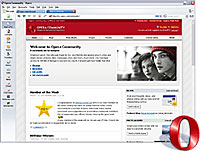 Previously, Opera was only available free if users were prepared to put up with a distracting ad banner stuck on the top of the browser interface, with the option to shell out for a $39 (£21.60, €32) licensing fee to remove the thing and receive premium support.
Previously, Opera was only available free if users were prepared to put up with a distracting ad banner stuck on the top of the browser interface, with the option to shell out for a $39 (£21.60, €32) licensing fee to remove the thing and receive premium support.
Not surprisingly, punters fed up with Internet Explorer’s well publicised security problems were far keener to try out the free Firefox browser than put up with Opera’s adverts. The Mozilla product now enjoys an 8 per cent market share.
Opera, however, can only muster 1 to 2 percent of the world’s Internet users, so they are hoping that by adopting Firefox’s freebie tactics they can substantially increase their user base.
“Our goal is to become on the desktop the number-two browser,” air-punched von Tetzchner.
The company expects to recoup lost sales revenue after striking deals with Google and other online search companies.
The deals will give Opera a cut of advertising revenues when, for example, a search typed into the browser’s built in search engine window is directed to Google advertising.
Von Tetzchner is confident that this advertising revenue will generate more than enough income to compensate for giving away Opera – if the company can persuade enough people to switch to their browser, of course.
As dry ice billowed around his feet and dramatic music filled the air, von Tetzchner bellowed out his pledge to the world: “As we grow our userbase, our mission and our promise remain steadfast: we will always offer the best Internet experience to our users – on any device. Today this mission gains new ground.”
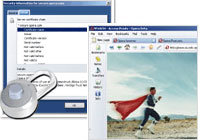 It seems a bit of a gamble to us – both IE and Firefox are also available free of charge and without a huge marketing campaign we can’t see how they’re going to get enough users to switch from their far better known rival products.
It seems a bit of a gamble to us – both IE and Firefox are also available free of charge and without a huge marketing campaign we can’t see how they’re going to get enough users to switch from their far better known rival products.
Although we’re sticking with Firefox for now, there’s no denying that Opera is an excellent product and definitely worth downloading – especially now that it’s free!
The Opera browser is available in 20 languages and with the complete download weighing in at a bandwidth-unbothering 4MB, we recommend you give it a go!
 Once again, the UK has grabbed the number one slot on Top Of The Bots, possessing the world’s highest proportion of known bot-infected computers.
Once again, the UK has grabbed the number one slot on Top Of The Bots, possessing the world’s highest proportion of known bot-infected computers. Symantec puts this down to the huge rise in broadband subscriptions coupled with the delays in software patches for operating systems and software being made available.
Symantec puts this down to the huge rise in broadband subscriptions coupled with the delays in software patches for operating systems and software being made available. Yo! Yo! Yo! Word! The Associated Press are getting hip and launching a news service for da yoot. Wicked, innit?!
Yo! Yo! Yo! Word! The Associated Press are getting hip and launching a news service for da yoot. Wicked, innit?! So far, more than 100 newspapers have signed up for asap, with the option to use the content for their online editions, print editions or both.
So far, more than 100 newspapers have signed up for asap, with the option to use the content for their online editions, print editions or both.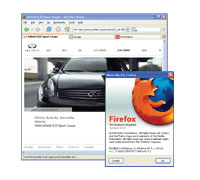 Mozilla have made their first preview of Firefox 1.5 Beta 1 – code named “Deer Park” – available to early adopters, Web developers and Extension writers.
Mozilla have made their first preview of Firefox 1.5 Beta 1 – code named “Deer Park” – available to early adopters, Web developers and Extension writers. Mike Schroepfer, Mozilla’s director of engineering said that automatic updating will reduce the size of patches by 10 to 20 times, explaining that the feature will remove the current requirement for users to download the entire browser to obtain fixes.
Mike Schroepfer, Mozilla’s director of engineering said that automatic updating will reduce the size of patches by 10 to 20 times, explaining that the feature will remove the current requirement for users to download the entire browser to obtain fixes. The boffins at the US National Science Foundation (NSF) have proposed “re-engineering” the Internet to create a whizz-bang updated version that connects all kinds of devices with built in security and robustness.
The boffins at the US National Science Foundation (NSF) have proposed “re-engineering” the Internet to create a whizz-bang updated version that connects all kinds of devices with built in security and robustness. The goals of the GENI Initiative include a new core functionality for the Internet, with new naming, addressing, and identity architectures; enhanced capabilities, including additional security architecture and a design for high availability; and new Internet services and applications.
The goals of the GENI Initiative include a new core functionality for the Internet, with new naming, addressing, and identity architectures; enhanced capabilities, including additional security architecture and a design for high availability; and new Internet services and applications.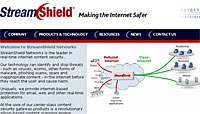 Straight out of the text book of Thinly Veiled Product Placement Exercises comes this featherlight-fluff from StreamShield, who commissioned a survey asking the vital question: “Are women more sensible surfers?”
Straight out of the text book of Thinly Veiled Product Placement Exercises comes this featherlight-fluff from StreamShield, who commissioned a survey asking the vital question: “Are women more sensible surfers?”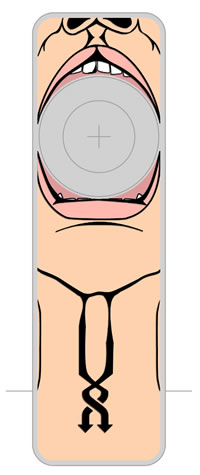 Shortly after the launch of the Apple iPod shuffle, if not simultaneously, manufacturers were quick to jump on the bandwagon by producing and offering thin cases or skins.
Shortly after the launch of the Apple iPod shuffle, if not simultaneously, manufacturers were quick to jump on the bandwagon by producing and offering thin cases or skins. Design your own shuffle cover Shuffle Art Archives is an enterprising Japanese Web site which has assembled collections of designs for decorative stickers that you can apply to your little white pride and joy.
Design your own shuffle cover Shuffle Art Archives is an enterprising Japanese Web site which has assembled collections of designs for decorative stickers that you can apply to your little white pride and joy.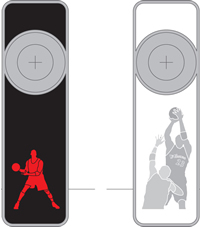 While some people take the simple approach and cover only one face of the player, others are more devoted and produce stickers for
While some people take the simple approach and cover only one face of the player, others are more devoted and produce stickers for  AOL is giving away hundreds of thousands of dollars of gold, cash and goods seized from a spammer as a warning to anyone thinking of “making a living sending spam to AOL members”.
AOL is giving away hundreds of thousands of dollars of gold, cash and goods seized from a spammer as a warning to anyone thinking of “making a living sending spam to AOL members”. The company said it managed to close down the dastardly spammer’s 40-computer enterprise thanks to help from its members, who enthusiastically clicked a “report spam button” to register their complaints.
The company said it managed to close down the dastardly spammer’s 40-computer enterprise thanks to help from its members, who enthusiastically clicked a “report spam button” to register their complaints. Thanks to its aggressive mo’fo’ antispam filters, AOL has claimed that spam on their servers has fallen by more than 85 percent since its peak in late 2003.
Thanks to its aggressive mo’fo’ antispam filters, AOL has claimed that spam on their servers has fallen by more than 85 percent since its peak in late 2003.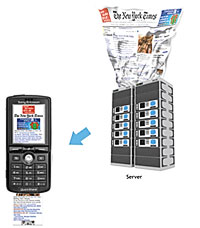 Norwegian browser brewers, Opera Software, have announced Opera Mini, a J2ME (Java 2 Mobile Edition) Web browser for “virtually all mobile phones”.
Norwegian browser brewers, Opera Software, have announced Opera Mini, a J2ME (Java 2 Mobile Edition) Web browser for “virtually all mobile phones”. The browser makes up for the feeble firepower of low end phones by using a remote server to pre-process Web pages before sending them to the phone, rather than trying to get the phone to process the pages.
The browser makes up for the feeble firepower of low end phones by using a remote server to pre-process Web pages before sending them to the phone, rather than trying to get the phone to process the pages.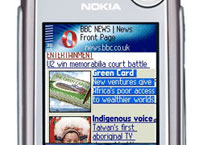 “With Opera Mini, the phone only has to run a small Java-client and the rest is taken care of by the remotely located Opera Mini server. With Opera Mini you don’t have to have an advanced phone to surf the Web, which means that most people can use it with their existing phones.”
“With Opera Mini, the phone only has to run a small Java-client and the rest is taken care of by the remotely located Opera Mini server. With Opera Mini you don’t have to have an advanced phone to surf the Web, which means that most people can use it with their existing phones.” Patriotically, Norway’s leading commercial television station, TV2, have already bundled Opera Mini with its mobile services in Norway to offer its viewers a complete mobile content package with a branded Web browser.
Patriotically, Norway’s leading commercial television station, TV2, have already bundled Opera Mini with its mobile services in Norway to offer its viewers a complete mobile content package with a branded Web browser. It used to be that artists rebelled against the system, the government, the breadheads and The Man, but artists signed to Sony in Japan are fighting their label’s decision not to make their songs available through the iTunes Music Store.
It used to be that artists rebelled against the system, the government, the breadheads and The Man, but artists signed to Sony in Japan are fighting their label’s decision not to make their songs available through the iTunes Music Store. Talks between the two electronic giants Sony and Apple are believed to be continuing to resolve the problem.
Talks between the two electronic giants Sony and Apple are believed to be continuing to resolve the problem.